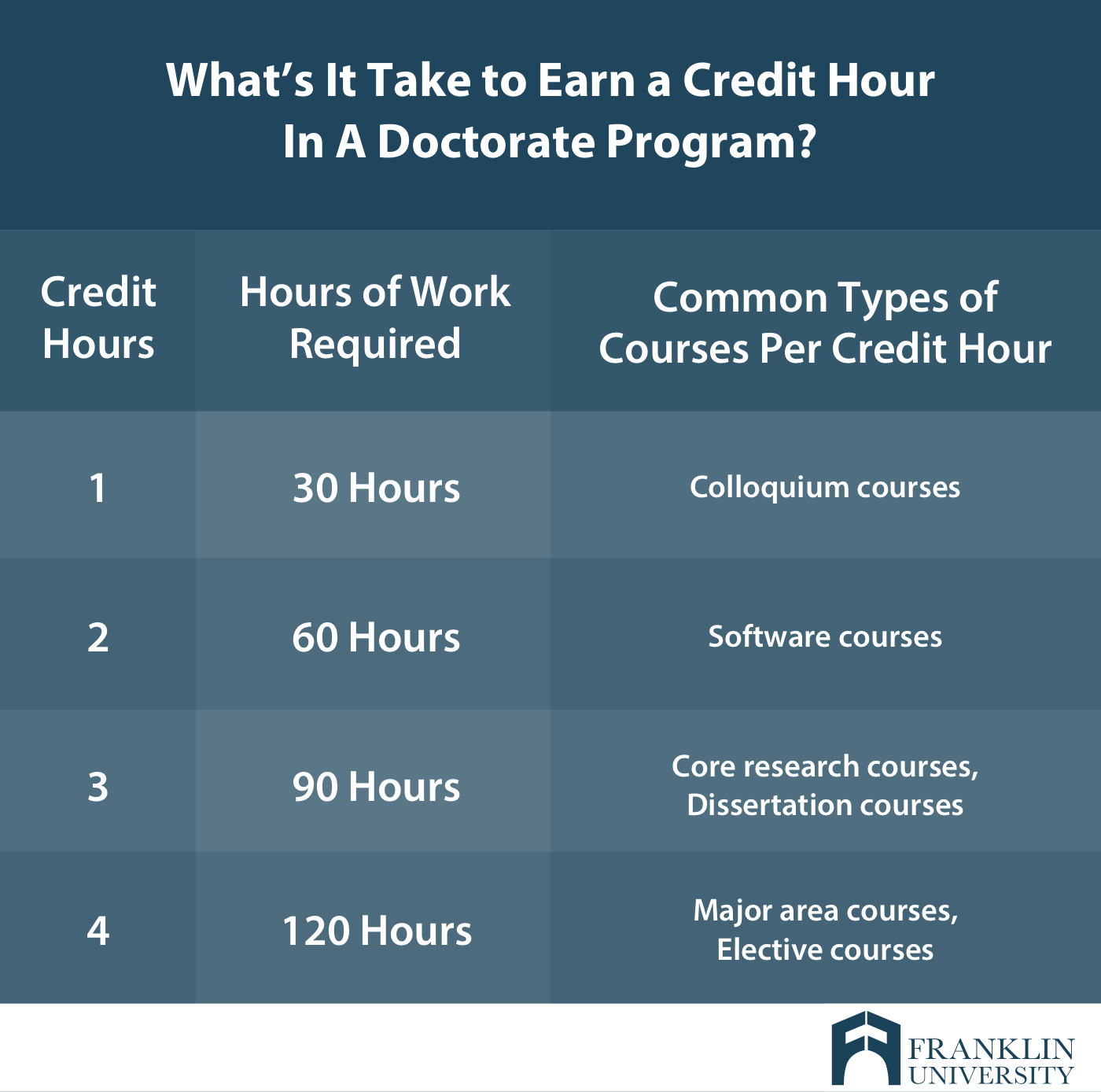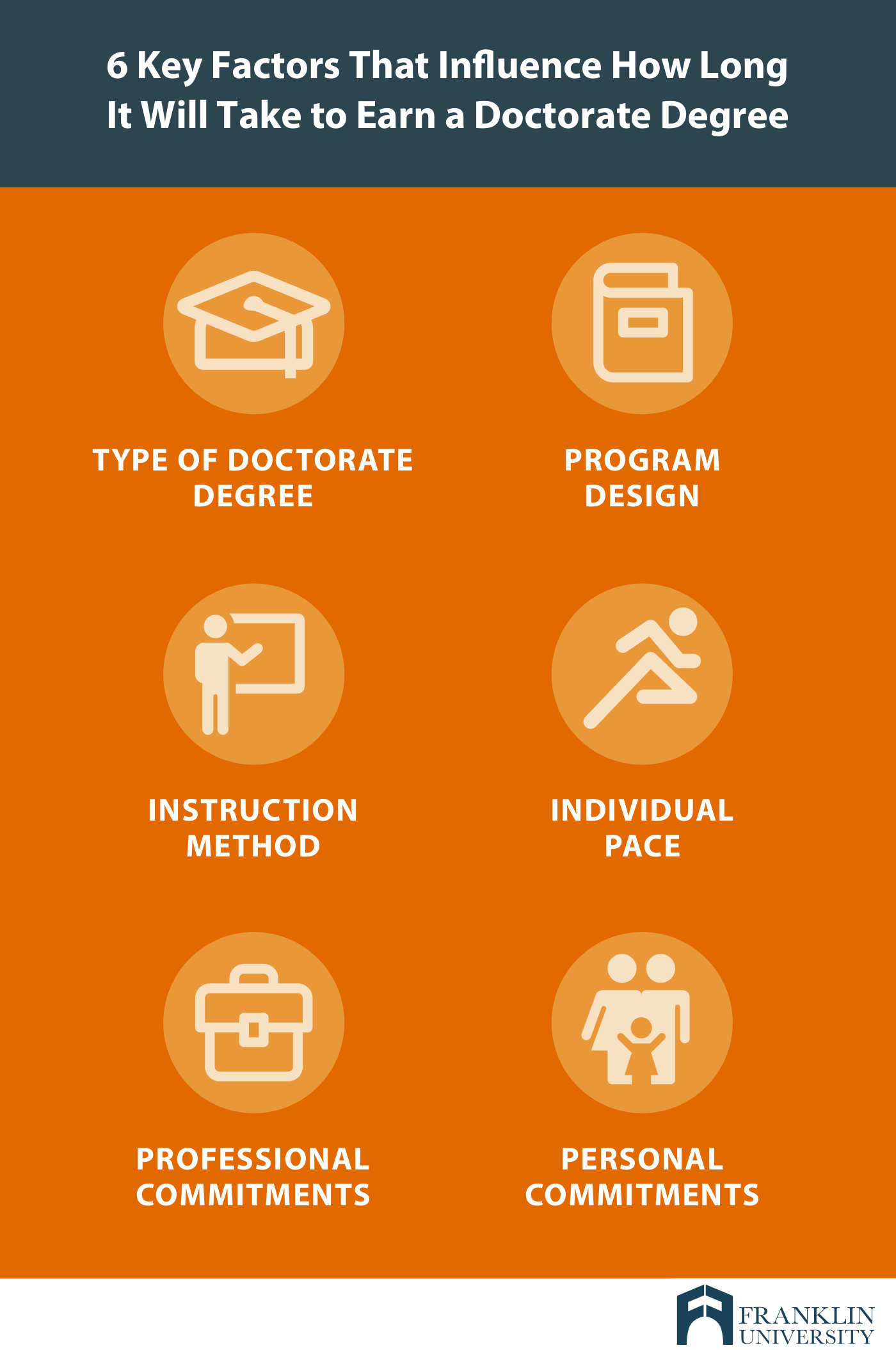Request Information
We're Sorry
There was an unexpected error with the form (your web browser was unable to retrieve some required data from our servers). This kind of error may occur if you have temporarily lost your internet connection. If you're able to verify that your internet connection is stable and the error persists, the Franklin University Help Desk is available to assist you at helpdesk@franklin.edu, 614.947.6682 (local), or 1.866.435.7006 (toll free).
Just a moment while we process your submission.

How Many Credits Are Required for a Doctorate Degree?
Doctorate degrees are an in-demand credential for people who want to be at the top of their field—whether they’re looking to advance their professional career or teach at the college or university level.
In this blog, we help you better understand the range of credit hours for doctorate programs, who determines the credit requirements, and provide estimates about how hours equate to credit, which will help you understand how long it may take to earn your doctorate degree.
How Many Credit Hours Does it Take to Earn a Doctorate?
The hours needed to earn a doctorate varies widely—from 60 to 120 credit hours. This range large range is impacted by:
- Degree Type: The type of degree you earn—from traditional Ph.D. degrees to professional doctorates—is influential in determining your required credit hours. Most Ph.D. programs require the full 120 hours, while professional doctorates can require as few as 58 hours.
- Area of Study: What you choose to study will greatly impact your required credit hours. Subjects like the hard sciences and humanities may require fewer credit hours than fields like psychology.
- Institutional Requirements: Each university determines its curriculum structure, number of credit hours per class and required credit hours for each program. Even if you’re earning the same degree, some schools will require more or less credits based on how their program is structured.
- Regional and State Requirements: Every university is governed by both regional and state accrediting bodies. These accrediting bodies determine the minimum credit required to earn a doctorate. For example, the State of Ohio requires students earn a minimum of 60 credit hours beyond their bachelor’s degree credits.
To determine how many credit hours will be required for the doctorate degree of your choice you’ll need to research individual programs at institutions.
Earning a doctorate is challenging and rewarding, but do you know what to really expect? Download this free guide for tips and insights to help you prepare for success.
How Are Credit Hours Defined?
A credit hour is defined by the amount of time required—in the classroom setting, as well as outside researching and studying—to complete a course. For most terminal degrees, one course is worth 3 to 4 credit hours. The number of credit hours associated with a course is determined at the university level.
At Franklin University, each credit hour equates to 30 hours worth of work. Most of our major courses are 4 credit hours, meaning it will take 120 hours worth of lessons, research and study during the term to complete the course.
There are 4 fundamental ways you earn credits in a doctoral program:
- Major Courses: Your major courses are fundamental to the subject matter of your degree. They’re focused on providing you with a breadth of experience crucial to success in the industry.
- Electives: Electives or focus area courses give you the opportunity to explore areas of specialization or in-depth study within your chosen degree program.
- Research Core: Your core research courses will teach you how to perform quantitative and secondary research, use common tools and software and prepare you with the writing skills you’ll need to write your dissertation.
- Dissertation Requirements: Your dissertation requirements commonly include a comprehensive exam, research and writing of your dissertation and a dissertation defense.

What Counts As a Previous Credit for a Doctorate Program?
While your required coursework is an obvious way to earn credits toward your doctorate degree, there may be other ways to earn credit depending on your program and institution.
When evaluating doctoral programs, you should look for ways to get credit for your previous education and professional experience.
Credit for Master’s Degrees or Previous Graduate Study
Many programs accept master’s degree credit, or credits completed at the graduate level, toward the total hours needed for a doctorate.
For example, if a doctorate program requires 90 hours of post-baccalaureate credit, up to 30 hours of master’s credit may apply toward the total credits needed to complete a doctorate.
Transfer Credit from Other Institutions
The amount of transfer credit accepted at the doctoral level varies from institution to institution. Programs with liberal transfer credit policies, like Franklin University, may allow you to transfer up to 24 hours of previously earned credit.
Credit for Professional Experience or Credentials
Certain programs will give you credit for credentials, certifications or professional education courses completed outside of a degree program.
One example of this type of credit is for Franklin University’s Ed.D. program. This doctoral program will accept professional education completed for a superintendent’s license as up to 15 hours of credit toward the doctorate.
How Long Will it Take to Earn the Credit Hours Needed to Complete a Doctorate Program?

While the number of credit hours for a doctoral program is set in stone, the length of time to graduation is highly dependent on a number of factors.
Type of Doctorate and Program
A Ph.D. program, on average, takes longer to complete than a professional doctorate. The average Ph.D. takes 8.2 years to complete, while a professional doctorate can be completed in as few as three years. There is also variance between individual areas of study within these degree classifications.
Instruction Method
Whether you attend an online program, an in-person program or a blended program that offers both options, your instruction method can greatly impact time to graduation.
- Online programs offer greater flexibility, which as a full-time student, usually results in a shorter time to graduation.
- In-person programs usually take longer to complete, often due to the additional commitments of teaching and research outside of the individual’s degree requirements.
- Blended programs provide the benefit of both methods of instruction, so time to graduation usually depends on individual availability and preference of instruction methods.
Individual Pace
For students in a professional doctorate program, a full-time student can earn a degree in three years, while students who attend part time are likely to take 4-5 years to complete a degree. However you plan to pursue your doctorate, be aware of the maximum time to completion.
For example, Franklin University’s maximum time to completion for a doctorate program is seven years. It’s unlikely it would take this long to complete your degree unless you take time off during the program.
Professional and Personal Commitments The pace at which you complete a doctorate is a personal choice. Depending on where you are in your career, you may want to continue working as you pursue your doctorate. You also need to consider the amount of time you can commit to your studies based on your personal situation, as well as the financial commitment you’re willing to make.
Whatever path you take, doctorate programs are rigorous and require a passion for your work and dedication to your studies. You must be ready to commit to attending classes (online or in-person), studying, researching and completing your dissertation.
Is Faster Better When it Comes to Earning Your Doctorate?
The number of credits required to complete your doctorate degree, and the amount of time it takes to complete these credits, is only one consideration when choosing a doctoral program. When it comes to the investment of your time, energy and finances, quicker isn’t always better.
You need to consider the quality of the program and if it meets your personal needs and professional goals. For professionals looking to complete their doctorate while working full time, Franklin University offers flexible, online doctorate programs that can help you balance your short and long-term goals.
Explore Franklin University’s doctoral programs to advance your career while accelerating your time to graduation.





